What sets us apart from everyone?
Our Work!

100% Organic and Natural Food
Our entire production is based on a short supply chain,
with a low environmental impact
and with 100% organic procedures.
Want to know how we do it?
Tree Pruning
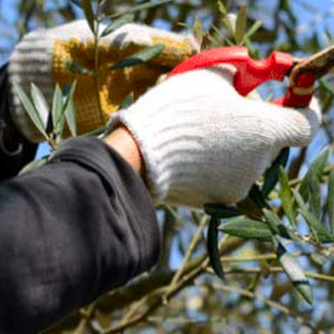
Pruning is a very important part of producing extra virgin olive oil from Taggiasca cultivars in Imperia and can, if done correctly, multiply the harvest. At Costa dei Campi, we practice chipping of the pruned branches (i.e., shredding them with a motorized tool), which offers two significant benefits: the chipped waste is used as fertilizer on site, and by avoiding burning the green waste, we save the environment from carbon dioxide production and reduce fire risks, which are very common in the Imperia area for this reason.
Plant Mowing
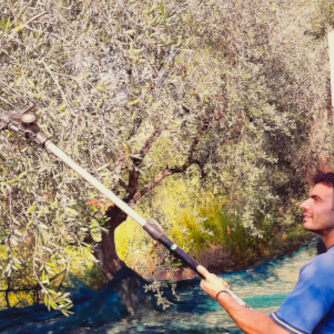
Unlike the usual use of poisonous herbicides to eliminate unwanted weeds and plants in the olive grove, which filter through the soil and flow into small water channels, reaching streams, rivers, and eventually the sea, polluting it, at Costa dei Campi, aware and sensitive to these environmental issues, we practice mowing using brush cutter machinery during the driest periods when the mowed grass also serves as mulch (covering from sunlight) to keep the soil cool and protected from high temperatures.
Furthermore, the herbs, flowers, and small plants deliberately "preserved" in the olive groves serve as deterrents against many types of insects and flies that are antagonistic to the Taggiasca olive.
Soil Fertilization
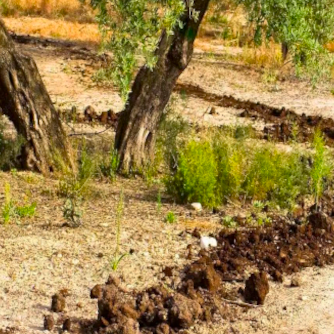
Unfortunately, the need to produce at an industrial/intensive level has led large extra virgin olive oil companies to use large quantities of synthetic chemical fertilizers that "spoil" the olive trees in the early years but cause significant soil deficiencies and various plant diseases in the long term. For example, it is believed that the famous Puglian xylella could be the result of abundant and excessive chemical fertilizations that cause the plant to "go mad" and die.
In a healthy and responsible agriculture where observing the soil, leaves, and stems is crucial for maintaining the ecosystem, the use of animal fertilizers obtainable within or near the farm is more appropriate. Those who once cultivated Taggiasca olives in Liguria were aware of this fundamental factor: it was normal to let herds graze on the plots of land.
At Costa dei Campi, this habit is still preserved where possible, while where the herds cannot reach, manual fertilization is carried out. With this "gentle" process, not only is the soil enriched sustainably, but the Taggiasca olive from Costa dei Campi gains in quality, and the consumer gains in HEALTH!
Biological Treatments Against Pests
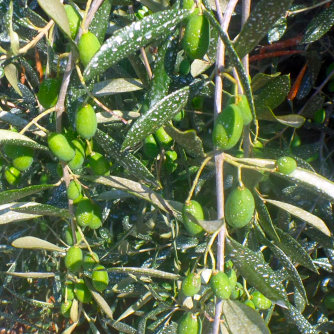
The large-scale use of DIMETHOATE for spraying has caused severe environmental damage, the extermination of bees, and deadly diseases for humans throughout Italy for many years.
Fortunately, but too late, it was withdrawn from the market in 2020, although some cunning farmers still use it. Other remedies have been found to combat the fly and the bug (the natural pests of the Taggiasca olive) in the olive groves of Imperia: less poisonous and with less impact on the ecosystem.
The remedies that set us apart from most olive oil companies and Taggiasca monocultivar extra virgin olive oil producers in Imperia are the result of studies, tests, field trials, and failures over many years. Sustainable methods with zero environmental impact are slower and more rigid but effective if practiced in advance: BEING PROACTIVE is one of Costa dei Campi's prerogatives.
The rock dust we spray on the foliage covers the leaves and drupe (the fruit of the olive tree) with a grayish patina, making them less appetizing and inviting to the usual pests, who, seeing that color and soiling their wings with this dust, prefer to fly elsewhere, leaving our beloved olive untouched.
Of course, as with all organic methods, good technical skills in treatment are necessary, and it is not always effective.
Other methods used include traps (tap-trap) containing alcoholic and protein solutions that attract and trap insects, eliminating them. This also applies to fruit wasps or the infamous velvety wasp that so troubles beekeepers, who must fight these insects to protect their hives.
For some time now, studies have also been underway to explore the possibility of cultivating herbs and plants near the crops that would attract and distract certain types of insects from the ripening olive. In short, ORGANIC farming requires constant study, respect for the environment, and great determination in researching and experimenting with new remedies. And this is what truly sets us APART from others.
Olive Harvesting and Processing
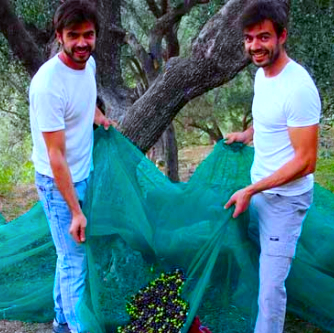
Observing the olive helps us understand when it is time to act and start harvesting. Ripeness must be perfect: with a fruit that is too green, we will have a more bitter and unripe result with poor yields, while with a fruit that is too ripe, we get oil that is too delicate and not very fruity. Ripeness is therefore crucial for the success of high-quality extra virgin olive oil.
The oil from Costa dei Campi is obtained by identifying the most suitable time for harvesting and, once carried out, the product is pressed and processed within a maximum of 24 hours.
The liquid, rich in antioxidant properties, polyphenols, and nutrients, is left to decant in stainless steel barrels for up to 30 days before being bottled and purchased by our customers. In this process, no filtration is done to remove the excess residue, which in our opinion is an indicator of great quality. Unlike the mass production of large oil giants who market standardized oils for convenience, at Costa dei Campi, each harvest season is different. Consequently, the flavors also change, and for this reason, the oil from Costa dei Campi is always different, and each year is a new journey to discover. A true “LIQUID POETRY”!


